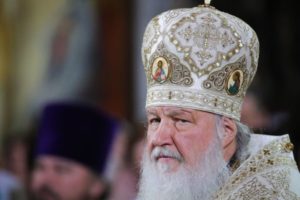Lithuania proposes EU to impose sanctions against Patriarch Kirill

Lithuania offers the European Union to include Patriarch of Moscow and All Rus' Kirill in the sanctions lists because, according to Vilnius, he supports the military operation in Ukraine. This was announced to the 15min portal by the head of the Lithuanian Foreign Ministry, Gabrielius Landsbergis.
“Yes, there is such a proposal, as long as discussions are underway, we do not have final decisions on whether it will be possible to do this,” he said. The imposition of sanctions requires the consent of all EU countries. “This person [Kirill], in my opinion, is not engaged in pastoral care, but destroys souls, if you try to find some kind of spiritual term to describe his statements,” the minister added.
Landsbergis also said that the authorities are taking part in discussions about the separation of the Lithuanian Orthodox Church from the Moscow Patriarchate, but "this is primarily a matter of self-determination of the people and community."
RBC sent a request to the synodal department for relations between the Church, society and the media.
Patriarch Kirill explained the anti-Russian sentiment in the world with "Apocalypse" Politics
The head of the department, Vladimir Legoyda, told Interfax that "the imposition of sanctions against religious leaders is nonsense, a rejection of common sense." In his opinion, the words of the Lithuanian minister are "already some kind of anti-diplomacy", since the task of the Foreign Ministry is "to preserve the channels of communication, and not to destroy its last possibilities."
The Lithuanian Orthodox Church is one of the nine traditional religious communities in Lithuania (the state recognizes Roman Catholic, Greek Catholic, Evangelical Lutheran, Evangelical Reformed, Orthodox, Old Believer, Jewish, Sunni Muslim and Karaite communities), it is subordinate to the Moscow Patriarchate . The community is headed by Metropolitan Innokenty, Archbishop of Vilna and Lithuania.
Read on RBC Pro Pro Why the authorities are going to deprive foreign securities of tax benefits ArticlesPro Need a Dialogue: How Product Manufacturers Respond tosanctions Articles Pro personal income tax in a new way:what companies should pay attention to after March 2022how to deal with communication distortion Pro Carbon Branding Instructions:why companies release clone products6 Career-Important Skills You'll Learn During Your Job Search Pro Articles You want to recognize a force majeure sanction.How to proceed InstructionsSee also Muscovites continue to be served at McDonald's restaurants 01:28
As LRT wrote, seven Orthodox priests were suspended from service in Lithuania, who expressed disagreement with Moscow's position on the Russian military operation. Metropolitan Innokenty stated that the dismissed clergy had long planned to move to the Patriarchate of Constantinople, but they denied this and, in turn, suggested that Innocent “is under external pressure.” The metropolitan responded by saying that he did not abandon his previous position - in March he condemned the military operation.
Patriarch Kirill, after the outbreak of hostilities on Ukrainian territory, said that the peoples of Russia and Ukraine are a single entity that "external forces" are trying to divide, they are also "the enemy of the human race", and accused these forces of spreading lies. He called on society to “rally around the authorities” in order to achieve solidarity and be able to repel external and internal enemies, and said that forces opposed to Russia are trying to tear the Church away from the people.
In March, Kirill blamed the weakness of the priests of the Ukrainian Orthodox Church of the Moscow Patriarchate, who, after the start of the military operation, refused to commemorate him during prayer.




























































